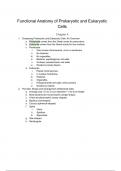Prokaryotic and eukaryo Study guides, Class notes & Summaries
Looking for the best study guides, study notes and summaries about Prokaryotic and eukaryo? On this page you'll find 52 study documents about Prokaryotic and eukaryo.
All 52 results
Sort by
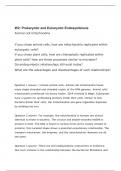
-
BIOL202 Week 2 Discussion; Prokaryotic and Eukaryotic Endosymbiosis
- Other • 2 pages • 2023
-
- $12.99
- + learn more
Week 2: Prokaryotic and Eukaryotic Endosymbiosis Animal cell mitochondria • If you chose animal cells, how are mitochondria replicated within eukaryotic cells? • If you chose plant cells, how are chloroplasts replicated within plant cells? How are these processes similar to microbes? • Do endosymbotic relationships still exist today? • What are the advantages and disadvantages of such relationships?
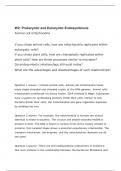
-
BIOL202 Week 2 Discussion; Prokaryotic and Eukaryotic Endosymbiosis
- Other • 2 pages • 2023
- Available in package deal
-
- $19.49
- + learn more
Week 2: Prokaryotic and Eukaryotic Endosymbiosis Animal cell mitochondria • If you chose animal cells, how are mitochondria replicated within eukaryotic cells? • If you chose plant cells, how are chloroplasts replicated within plant cells? How are these processes similar to microbes? • Do endosymbotic relationships still exist today? • What are the advantages and disadvantages of such relationships?
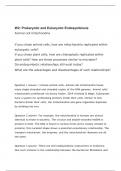
-
BIOL202 Week 2 Discussion Prokaryotic and Eukaryotic Endosymbiosis APU
- Other • 2 pages • 2024
- Available in package deal
-
- $17.99
- + learn more
Week 2:ProkaryoticandEukaryoticEndosymbiosis Animalcellmitochondria • Ifyouchoseanimalcells,howaremitochondriareplicatedwithineukaryoticcells? • Ifyouchoseplantcells,howarechloroplastsreplicatedwithinplantcells?Howaretheseprocessessimilartomicrobes? • Doendosymboticrelationshipsstillexisttoday? • Whataretheadvantagesanddisadvantagesofsuchrelationships?
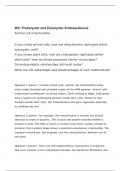
-
BIOL202 Week 2 Discussion; Prokaryotic and Eukaryotic Endosymbiosis
- Other • 2 pages • 2023
-
- $18.49
- + learn more
Week 2: Prokaryotic and Eukaryotic Endosymbiosis Animal cell mitochondria • If you chose animal cells, how are mitochondria replicated within eukaryotic cells? • If you chose plant cells, how are chloroplasts replicated within plant cells? How are these processes similar to microbes? • Do endosymbotic relationships still exist today? • What are the advantages and disadvantages of such relationships?

-
Topic B1 Cell Structure And Cell Organisation - Prokaryotic And Eukaryotic Questions and answers latest update
- Exam (elaborations) • 1 pages • 2024
- Available in package deal
-
- $13.99
- + learn more
Topic B1 Cell Structure And Cell Organisation - Prokaryotic And Eukaryotic Questions and answers latest update

-
BIOD 101 Module 6 Prokaryotic and Eukaryotic Questions and Answers 2023/2024
- Exam (elaborations) • 14 pages • 2024
-
Available in package deal
-
- $13.49
- + learn more
BIOD 101 Module 6 Prokaryotic and Eukaryotic Questions and Answers 2023/2024 Composition of Eukaryotic cells - Correct Answer membrane-bound nucleus (which houses DNA) and specific organelles Difference between animal and plant eukaryotic cells - Correct Answer Animal have no cell walls, plant have rigid cell walls Main differences between prokaryotic and eukaryotic cells - Correct Answer Prokaryotic are less complex, lack a nucleus and other membrane-bound organelles, are smaller, and or...
This document has highlighted important information and reference images to help study. This document goes over chapter 4.
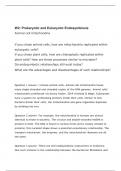
-
BIOL202 Week 2 Discussion; Prokaryotic and Eukaryotic Endosymbiosis
- Other • 2 pages • 2023
-
- $14.49
- + learn more
Week 2: Prokaryotic and Eukaryotic Endosymbiosis Animal cell mitochondria • If you chose animal cells, how are mitochondria replicated within eukaryotic cells? • If you chose plant cells, how are chloroplasts replicated within plant cells? How are these processes similar to microbes? • Do endosymbotic relationships still exist today? • What are the advantages and disadvantages of such relationships?
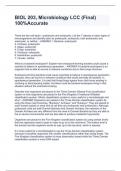
-
BIOL 203, Microbiology LCC (Final) 100%Accurate
- Exam (elaborations) • 47 pages • 2024
-
Available in package deal
-
- $13.99
- + learn more
BIOL 203, Microbiology LCC (Final) 100%Accurate There are two cell types - prokaryotic and eukaryotic. List the 7 classes or basic types of microorganisms and identify each as prokaryotic, eukaryotic, both prokaryotic and eukaryotic, or neither. - ANSWER 1. Bacteria- prokaryotic 2. Archaea- prokaryotic 3. Algae- eukaryotic 4. Fungi- eukaryotic 5. Protozoa- eukaryotic 6. Helminthes- eukaryotic 7. Viruses- neither What is a bacterial endospore? Explain how endospore-forming bacteria c...
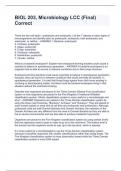
-
BIOL 203, Microbiology LCC (Final) Correct
- Exam (elaborations) • 47 pages • 2024
-
Available in package deal
-
- $13.99
- + learn more
There are two cell types - prokaryotic and eukaryotic. List the 7 classes or basic types of microorganisms and identify each as prokaryotic, eukaryotic, both prokaryotic and eukaryotic, or neither. - ANSWER 1. Bacteria- prokaryotic 2. Archaea- prokaryotic 3. Algae- eukaryotic 4. Fungi- eukaryotic 5. Protozoa- eukaryotic 6. Helminthes- eukaryotic 7. Viruses- neither What is a bacterial endospore? Explain how endospore-forming bacteria could cause a scientist to believe in spontaneous gen...

Did you know that on average a seller on Stuvia earns $82 per month selling study resources? Hmm, hint, hint. Discover all about earning on Stuvia



